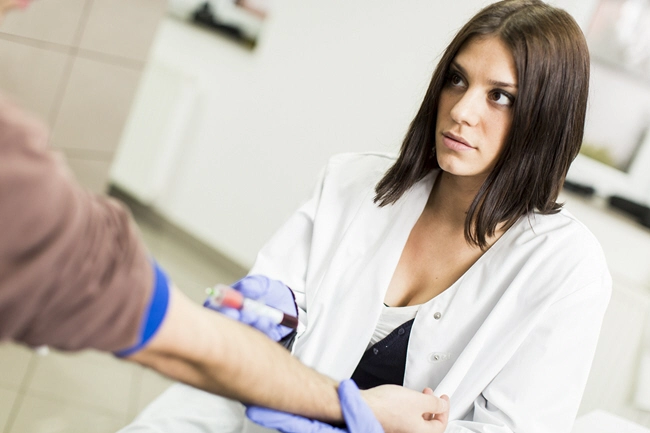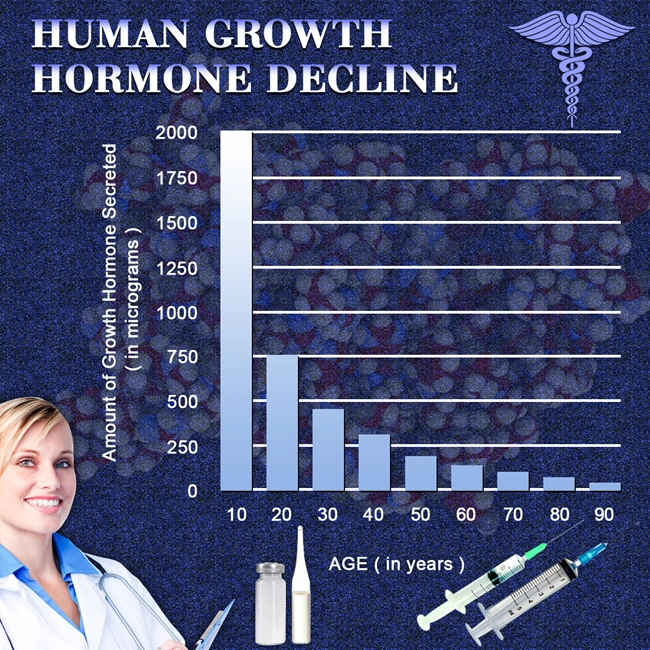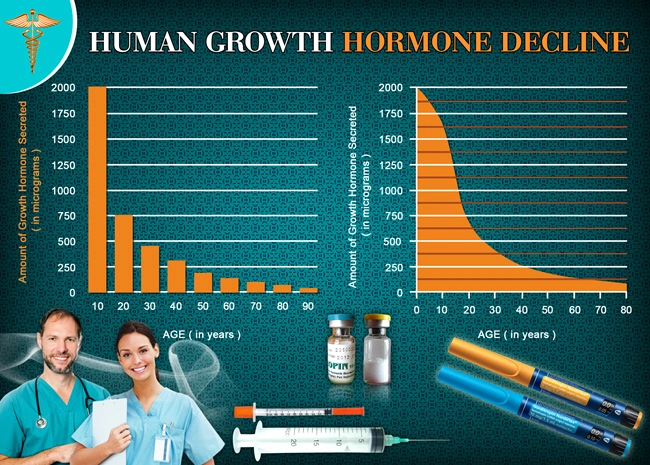
Video Link: https://vimeo.com/286854910
Video Download: Click Here To Download Video
Video Stream: Click Here To Stream Video
ANN ARBOR, Mich. — Mark Cuban, the famous Internet entrepreneur and owner of the Dallas Mavericks, has continued his outspoken support for the possible use of Human Growth Hormone (HGH) by funding a study by University of Michigan scientists and physicians to explore how Human Growth Hormone may speed up recovery from an ACL tear -- one of the most incessant, distressing, and feared knee injuries among athletes.
The funding is being provided by the Mark Cuban Foundation.
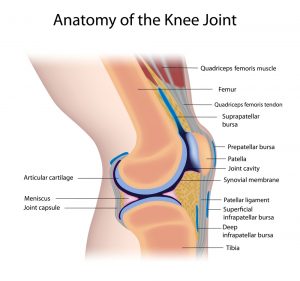 Anterior Cruciate Ligament (ACL) tears strike nearly 250,000 people a year and were particularly notorious among professional athletes.
Anterior Cruciate Ligament (ACL) tears strike nearly 250,000 people a year and were particularly notorious among professional athletes.
Almost a quarter of NBA players and a third of NFL players who suffer an ACL tear have seen their careers ended prematurely.
And even the athletes who do make it back usually miss over three-quarters of the regular season and require over a year of recovery time.
As with most medical procedures, advances have been made in both surgical techniques and quick rehab.
However, in spite of this progress, nearly a quarter of a million patients who experience ACL tears yearly continue to suffer perpetual weakness and weakened muscles. This is devastating for anyone, particularly so for professional athletes.
This gap hinders their ability to regain their prior form of sports performance and might cause problems years after they retire by increasing their odds of developing debilitating osteoarthritis.
The trial will determine if HGH can safely enhance recovery and assist in prevent long-term osteoarthritis and knee joint weakness after an ACL tear.
“There is a large body of research on growth hormone, and our study will be the first of its kind to explore whether it may aid recovery from an ACL tear," says principal investigator Christopher Mendias, Ph.D., ATC, assistant professor of Orthopaedic Surgery and Molecular & Integrative Physiology at the University of Michigan Medical School and MedSport researcher.
"We think that a brief treatment with growth hormone around the time of surgery will help to limit some of the otherwise irreversible loss of muscle mass and strength that occurs after these injuries."
The study will span two years and will be a double-blind, placebo-controlled trial. Neither the patients nor their doctors will know if they are taking the drug or receiving a placebo until the study is completed.
A safety committee consisting of U-M physicians will monitor patient health and safety during the study. The trial will determine if patients regain full knee strength within six months after surgery.
HGH (somatropin) is available by prescription and is often used to stave off muscle atrophy and wasting in patients with Human 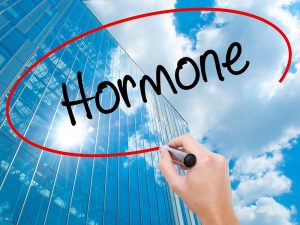 Immunodeficiency Virus (HIV, commonly referred to as AIDS) and other severe medical conditions.
Immunodeficiency Virus (HIV, commonly referred to as AIDS) and other severe medical conditions.
Research from the University of Copenhagen has found that HGH can arrest muscle loss in healthy individuals who are out of action for a brief period.
However, if used at a high dose for a long time, it can produce substantial gains in muscle mass.
Since there is this potential, growth hormone is banned in most professional sports organizations worldwide.
“There are a lot of assumptions about how growth hormone may impact athletic performance and sports injuries, but these claims are not supported by substantial scientific evidence,” Mendias says.
"We hope our findings will help professional sports organizations make more informed decisions about whether growth hormone should remain a banned substance or be used as a treatment that can safely aid healing in players, return them to their pre-injury strength levels and reduce other long-term musculoskeletal risks which result from these injuries.
The dose and timing of growth hormone in this study were carefully chosen to prevent the loss of muscle mass following ACL tear and reconstruction, but not lead to muscle gains elsewhere in the body.”
"Improving the recovery of professional athletes with ACL tears will likely have a significant short-term impact on their playing careers but also help avoid long-term health problems like osteoarthritis that can diminish the quality of life and limit how active they can be as older adults,” says Mendias.
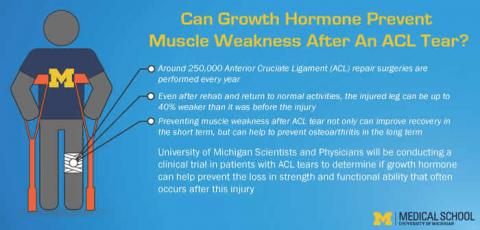 Mendias and his team at U-M’s MedSport clinic have specialized in sports medicine therapies, and have conducted several studies to upgrade the treatment of patients suffering from muscle loss due to rotator cuff tears or ACL tears.
Mendias and his team at U-M’s MedSport clinic have specialized in sports medicine therapies, and have conducted several studies to upgrade the treatment of patients suffering from muscle loss due to rotator cuff tears or ACL tears.
“We hope our results bring new insight into the field of sports medicine and the quest to help both recreational and professional athletes more quickly return to the activities they enjoyed before, and improve their long-term quality of life.”
This trial has been reviewed and approved by the Food and Drug Administration, and is registered on ClinicalTrials.gov (NCT02420353).
References
Mark Cuban Funds Major Study on Growth Hormone Therapy
https://healthgains.com/blog/growth-hormone/mark-cuban-funds-study-growth-hormone-therapy/
Contact Us Today For A Free Consultation
Dear Patient,
Once you have completing the above contact form, for security purposes and confirmation, please confirm your information by calling us.
Please call now: 1-800-380-5339.
Welcoming You To Our Clinic, Professor Tom Henderson.
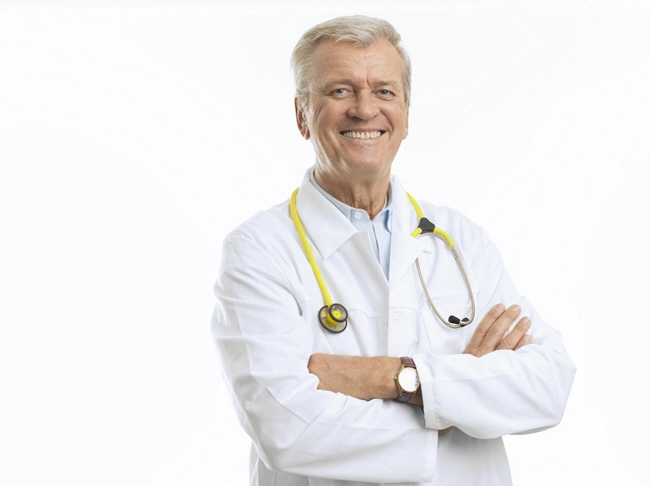
- My Personal HGH Experience [Last Updated On: February 11th, 2025] [Originally Added On: October 23rd, 2020]
- Growth Hormone and The Lymphatic System [Last Updated On: February 11th, 2025] [Originally Added On: October 11th, 2021]
- When I Was Young Things Were Better, Not! [Last Updated On: September 4th, 2025] [Originally Added On: June 8th, 2022]
- An Investment Advisor’s Life Turned Around With HGH injections, Hormone Testimonial [Last Updated On: June 4th, 2025] [Originally Added On: February 1st, 2023]
- Hardworking Lawyer’s Practice Saved by Hormone Replacement Therapy [Last Updated On: June 5th, 2025] [Originally Added On: March 1st, 2023]
- Choose Our Clinic: Our Physicians Are Board-Certified! [Last Updated On: September 22nd, 2025] [Originally Added On: March 23rd, 2023]
